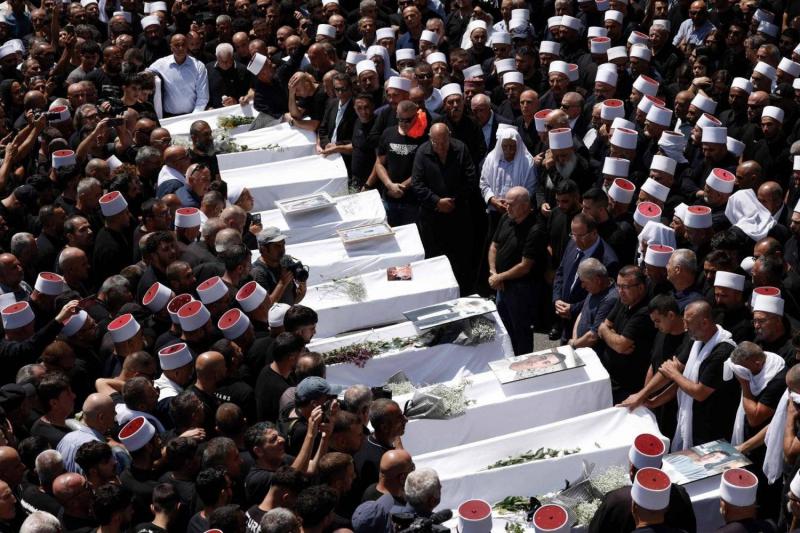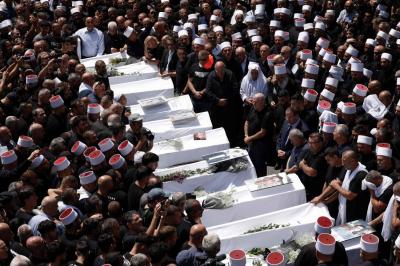Israel and Hezbollah have adhered to unwritten rules in their low-intensity conflict, understanding that their enemy possesses formidable firepower. As a result, both sides have tried to limit their strikes, targeting military objectives or border towns that had been evacuated after approximately 150,000 civilians fled. On July 27, these rules were shattered, according to *The Economist*, when a rocket hit a soccer field in the town of Majdal Shams in the Golan Heights, killing 12 children and injuring dozens more. This attack was the deadliest on Israeli-controlled territory since October 7, when Hamas killed around 1,200 people.
When the identity of the victims from Majdal Shams emerged, as members of the Druze sect, Hezbollah quickly denied launching the rocket. However, it is almost certain that they did, as part of a larger barrage of rockets fired in response to a previous Israeli strike that killed four of its members. Israeli officials believe that the rocket was aimed at a military base on nearby Mount Hermon but missed its target. The magazine noted that Hezbollah has launched approximately 6,000 projectiles at Israel since October 8, when a series of reciprocal attacks began in solidarity with Hamas. This was the first time they denied a strike, having three reasons to avoid the blame.
The first reason relates to graphic images of mutilated young bodies circulating on social media, which even some of the group’s supporters found hard to accept. The second reason concerns Hezbollah's relationship with the Druze. This secretive sect, numbering around one million, resides in Lebanon, Syria, and Israel, harboring complex loyalties in each. In Israel, most Druze serve in the military and celebrate what they call "the blood covenant" with the Jewish state. In recent years, the main Druze coalition in Lebanon, led by the Jumblatt family, has allied with Hezbollah—a strange position after the Druze of Syria joined the uprising against the Assad government, which Hezbollah supports. The estimated 27,000 Druze in the Golan face the most complicated situation; since 1967, when Israel captured the plateau from Syria, they have tried to balance their loyalties. In 1981, Israel effectively annexed the Golan, although only the U.S. recognized it, offering the Druze full citizenship; most rejected it, but in recent years, especially since the outbreak of the Syrian civil war in 2011, many younger Druze have become Israeli citizens.
The generational divide among the Druze was evident at the funeral for the rocket victims on July 28. The procession began in the old town center, where the bodies were brought to a communal building known as the Syrian center. There were no visible Israeli flags, and Israeli politicians and military officers kept their distance. Even Muwaffaq Tareef, the spiritual leader of the Druze in Israel, was careful not to mention Israel or Hezbollah by name in his eulogy. Down the hill, near the hole in the field, younger residents wandered around the new sports center. "Of course, we are all Israelis now. That's the reality," said Taha Safadi. "We expect our country, Israel, to protect us," added Wisam Bader. Such expectations hint at the third reason Hezbollah is keen to distance itself: Israel swiftly treated the dead children as its citizens.
The attack on Majdal Shams has intensified pressure on Israeli Prime Minister Benjamin Netanyahu to act decisively against Hezbollah. He had hoped to enjoy, at least for a few days, the speech he delivered before the U.S. Congress on July 24. Instead, he had to cut short his trip to the United States. Israeli officials have promised a severe response: "Lebanese citizens have become hostages to Hezbollah, and they will have to pay for Hassan Nasrallah's reckless actions," stated one security official, referring to the Hezbollah leader. However, this response may not come immediately. Military planners remain cautious about being drawn into a full-scale war while also fighting in Gaza. The options being discussed aim to avoid that: either striking a key Hezbollah target deep in Lebanon or attacking Lebanese civilian infrastructure. Yet even these options could provoke Hezbollah to use its long-range missile arsenal against major population centers inside Israel.
The northern bloodshed could also impact the situation in Gaza. In recent weeks, Israeli and American officials anticipated progress in talks with Hamas. Palestinians hope to reach an agreement that begins with a temporary truce and the release of some Israeli hostages held in Gaza, potentially leading to further discussions about a permanent ceasefire. Negotiators fear that escalation on the Israeli-Lebanese border could divert efforts from those talks. However, this might lead to the opposite: the desire to avoid war in Lebanon may prompt Israel to move toward an agreement with Hamas. Hezbollah is unlikely to stop firing at Israel until the catastrophic war in Gaza ceases. Increasingly, the only alternative left for Israel besides a ceasefire appears to be war on multiple fronts.




